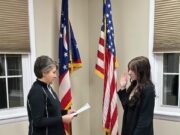Hiram – Kerry Martin Skora, professor and chair of religious studies at Hiram College, has recently returned to the U.S. after spending nine months in Bhutan as a Fulbright Scholar.
Bhutan – its people and culture – has been a longstanding research interest for Skora. He has traveled there seven times since 2003, including five Hiram College study abroad trips. But he calls this recent trip, where he spent nine months (from Dec. 2013 through Aug. 2014) teaching and researching as a Fulbright Scholar, the “peak of my academic career” – and rightfully so.
The Fulbright Scholar Program, coordinated by the U.S. Department of State Bureau of Educational and Cultural Affairs, is one of the most prestigious awards programs worldwide. Furthermore, Skora’s long-term Fulbright is the most prestigious of all Fulbright programs.
Bhutan, a small developing country of about 700,000, known for its policy of “Gross National Happiness,” is a land-locked country between Tibet and India and has largely remained free of Western influence.
“It’s a quirk of the history of humankind that Bhutan survived,” Skora said. “It preserved every strand of Buddhism. All the laws are set up that so that they’ll preserve this pristine environment.”
These laws include the country’s policy of “Gross National Happiness,” coined in 1972 by Bhutan’s fourth king. In the Western world, human economic progressions often negatively impact the ecosystem as a whole. “Gross National Happiness” takes into account how all living things are affected.
“When Bhutan creates a policy, they look at how it affects everyone and the wholeecosystem,” Skora explained. “For them, progress means that everything is well – all beings and all things that are part of their environment. This more holistic perspective, valuing all living things, nurtures happiness.”
For his Fulbright, Skora taught monks and Bhutanese teachers at several schools and institutions. He focused largely on the importance of preserving the precious Bhutanese culture, which he said is slowly becoming modernized.
“I realized that as an outsider, as an American, I could tell them what was most precious about their culture and what was most consistent with the king’s original vision,” he said. “They need religious studies scholars to tell them how important the model of spiritual ecology is not only for Bhutan but also for the whole world.”
Skora also worked with Bhutan’s Central Monastic Body as adviser on how to revise the traditional monastic curricula to make it more socially engaged and relevant in the 21st century. Suicide rates, drug use and violent crimes are all slowly rising, he said, because of the modern world moving in.
During his nine-month stay, Skora also shared and developed his research on Longchenpa, a Tibetan Buddhism teacher, who spent the end of his life in Bhutan. Skora said this long-term stay gave him a greater awareness of the connection between spirituality and ecology, and that he will be a better teacher and scholar because of it.
“I went back to many of the places Longchenpa walked, and I prayed at the place where he began writing his books on consciousness,” Skora said. “I feel like this is what I’m supposed to do. A lot of ideas that have been in my head for a long time, since graduate school, are coming together. The extended immersion allows ideas to flourish. I’m more inspired.”
Skora earned his B.A. from the University of Chicago and his Ph.D. from the University of Virginia. His wife, Kara Ellis Skora, who teaches religious studies as an adjunct professor at both the College of Wooster and Hiram College, and son Emmanuel Thomas George Skora who completed seventh grade at the Pelkhil School in Thimphu, accompanied him for most of the trip.










